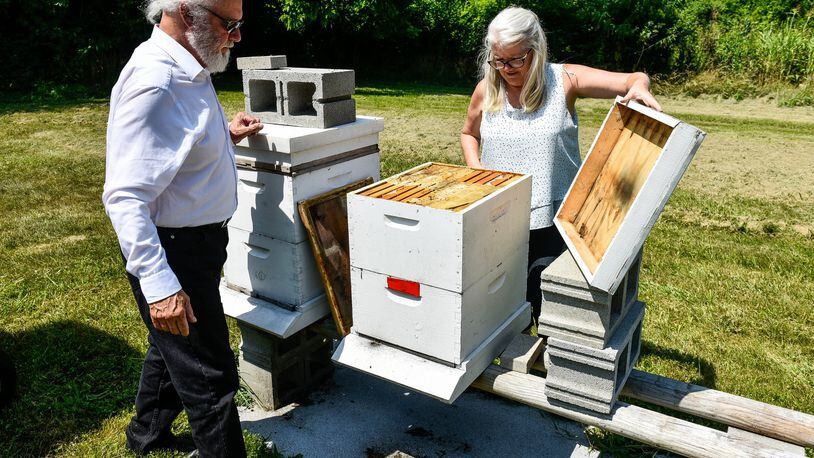MORE: Hamilton OKs bee hives inside city limits
“It took a long process to get through all the learning curves and end up here,” said Brown.
Yvonne was the first of the two to get into beekeeping. In 2012, she developed arthritis in her hand. While she was on a camping trip with her friends, one of them mentioned that the experimental bee sting therapy might be able to help with her arthritis. And while white grain products like sugar and flour were bad for her arthritis, honey was an allowed sweetener for her food.
“Years ago, these bees were the medicine cabinet for people,” she said. She set up a few small hives in her Fairfield backyard and began growing her own flavoring. Soon, her daughter was using the wax for lip balm and the bees became a key part of her life.
Johnny Mack Brown was a much more public figure before he started keeping bees. He’s managed John Brown Carpet and Flooring for over 40 years. With his son John Michael Brown, he also ran two real estate companies and lived a well-connected life. A former mayor of Fairfield works for him and he plays in a band with a magistrate judge.
MORE: Hamilton’s low dams may be altered to allow safer boating
It all came crashing down in November 2012, when John Michael Brown died. He was 46 years old. In the aftermath, Brown’s wife left him and he became mired in depression.
“I couldn’t see beyond the hour,” Brown admitted.
About a year later, he and Yvonne were introduced through mutual friends. They began spending time together and eventually developed a relationship. In April 2014, Yvonne took John to see the hives in her backyard.
Right away, he was struck with the possibilities of the insects. His son had held a passion for nature and animals and Brown had instincts for business.
“Here was the opportunity that could benefit not only John [Michael Brown]’s memory, but Yvonne and the general public,” he said.
“I was a novice with three or four hives,” Campbell remembered. “His vision was way beyond what I could have managed.”
The two of them began working together soon afterwards to turn the hives into a full local business. EZ Honey was established in the land behind his son’s former house, on the newly christened John Michael Brown Farms.
Beekeeping has a strong history in Butler County. Modern beekeeping is credited to Lorenzo Langstroth, a reverend who lived for decades in Oxford and whose home is maintained by Miami University. The hive structure he patented in 1852 is still used at apiaries around the world, including John Michael Brown Farms.
Bees are also a key insect in the economy. The USDA estimates that they provide $15 billion of value to agriculture and are key to the production of crops like almonds. In recent years, the mysterious Colony Collapse Disorder caused bee populations to drastically fall and they have only recently begun to rise again. According to the Ohio Department of Agriculture, over 2,700 new apiaries have been reported in Ohio since 2013. EZ Honey has 67 of the 841 hive colonies currently in Butler County.
For as simple as honey is to make, it can have a complex taste. The appearance and consistency depends on when during the year it’s harvested and how much moisture it contains. Because it’s based on the pollen bees gather, the taste depends on which plants are in the area.
“If you want to have good honey, you have to provide something for the bees to forage off,” Brown said. His farm includes pear trees and two recently-planted peach trees. Wild blackberries and wildflowers grow along the path between his farm and the Great Miami River.
Since beer aren’t native to North America, their population can be difficult to maintain. EZ Honey has to replace 40 percent of their bees every year. Brown says that the biggest factor in this is the Varroa mite. The parasite infects the eggs of the queen bees inside the hive, causing deformities and destabilizing the hive. The ODA says that over 23 percent of honeybee colonies in Butler County are infected by Varroa mites.
John Brown estimates that they would need over 100 hives to allow for a fully profitable business. EZ Honey sells for around $14 per bottle and most of their business comes from word of mouth. Some customers will drive over an hour to buy bottles from Yvonne in parking lots.
But honey is not the only focus of Brown’s ambitions. His goal is to turn the four-acre farm into a music park, where the hives sit alongside a concert pavilion. He dreams of a miniature train running along the back path and a restaurant with a view of the sunset over the trees.
“This is the nucleus,” Brown said. “Everything branches out from here.”
About the Author
